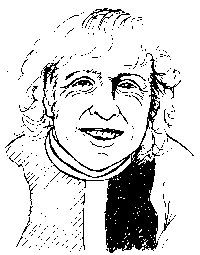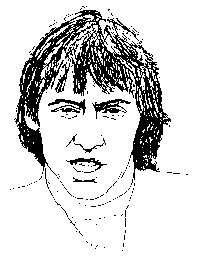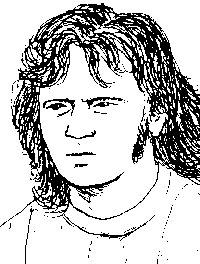Malcolm Allison wanted to save not only Crystal Palace, but English football, yet he will remembered mostly for what is called 'flamboyance' - his big cigar, big hat and a big mouth.
| Alan Whittle |
It was a surprise, given Palace's recent image, that no new players arrived during the summer, and the major change was one of presentation. The claret and blue, which had been a part of Palace's playing strip since the club was founded, was replaced by scarlet and royal blue stripes, a change anticipated by the cover of the previous season's programme, where a primary red stood for claret, which was more difficult to print. In order to comply with a progressive image, the nickname was changed inexplicably from The Glaziers to The Eagles, and a new crest designed accordingly, which mercifully retained a depiction of the original Crystal Palace building itself. Another gimmick, thankfully a short-lived one, was the printing of bogus nicknames in the programme alongside each player's name, so Tony Taylor became 'The Road Runner', Alan Whittle 'The Hustler', and so on, titles which also embellished their track-suit tops.
With Allison in charge, Palace were guaranteed more

| Malcolm Allison |
publicity than any other Second Division club, and the concensus before the season began was that a side containing so many well known names would bounce straight back into Division One. In typical Allison style, after losing the first game 4-1 at home to Notts County, the manager confidently predicted that "we won't just get promotion, we'll win the Second Division championship", and he clearly believed it. Encouraged by the promise shown by Jim Cannon, Allison gave sporadic first team chances to other youth team players Nicky Chatterton and Dave Swindlehurst, and kept faith in Bill Roffey as cover for the injured Paddy Mulligan. Martin Hinshelwood, who had played 16 games the season before despite a recurring back injury, was joined for a few games by his brother Paul, at that time an aspiring centre forward, but without doubt the most controversial choice was that of Paul Hammond in goal in place of John Jackson. Allison insisted that Hammond deserved his place on merit, but it seems more likely that the manager was determined to break with the old regime regardless, and Jackson was the ultimate symbol of that recent past, although most fans will agree that he kept Palace in Division One far longer than they deserved. After two games during which Hammond was mercilessly barracked by sections of the crowd, Jackson had a run of five games back in goal, but after being blamed for two of Cardiff's goals in a 3-3 draw, he was dropped again, and soon afterwards moved to Orient, an undignified end to his glorious Palace career. By this time, Orient were managed by former Palace trainer George Petchey, coached by Terry Long, and now had five ex-Palace players in the side, Jackson and Roffey joining David Payne, Gerry Queen and Phil Hoadley. Ironically, Orient went desperately close to winning promotion themselves at the end of the season, while Palace went rapidly downhill.

| Derek Jeffries |
Following that Cardiff game, and with his team badly adrift at the bottom of the Second Division, Allison made his first two signings - Derek Jeffries and Roy Barry - and threw them together in central defence, dropping both Mel Blyth and Iain Philip. Jeffries had been one of Allison's proteges at Maine Road, and as a 15 year-old he had described him as "one of the best prospects since Bobby Moore". Certainly he looked a cut above the usual centre half in terms of skill, but his new partner was a classic example of a 'stopper'. Roy Barry, a Scot, was a hard man who had recovered from a badly broken leg and regained his place at Coventry only to lose it, strangely enough, to John Craven, who Allison had rejected as a forward. Barry's arrival left no place for Bobby Bell, and after failing to attract any interest on the transfer market he went to try his luck in South Africa.
The new-look defence, with Mulligan having apparently recovered from his knee injury, didn't really improve matters, though, and with Whittle and Possee having failed to score a single goal between them, Allison's next move was for Southend winger Peter Taylor, which signalled the start of a steady improvement. Until now, Palace had been playing without true wingers, since Don Rogers had dropped back to a deeper position, in keeping with Allison's philosophy, the cornerstone of which was a belief in the short pass. Taylor's great strength was his crossing ability, and although he didn't score too many goals in his first season, he had a hand in the majority of Palace's goals, and gave the fans something to get excited about once again. Until now, Possee and Whittle had received most balls with their backs to the goal, and were failing to make clear chances for themselves, but now Peter Taylor was getting behind defences and lashing in the kind of crosses which neither Don Rogers or Charlie Cooke had been capable of. Unfortunately, Possee and Whittle were two of the shortest forwards in the league, and were hardly a menace to defenders in the air, so Allison signed Derek Hill, a centre forward from Ipswich, who did a lot of the donkey work up front without managing to score. With two new forwards in the side, Cooke and Tambling were released, and Palace made their final signings for the season, Jeff Johnson and Stewart Jump.

| Jeff Johnson |
On Boxing Day of 1973, Palace suffered the humiliation of losing 3-0 to the exiles at Orient, and went into the new year still in bottom place, with Malcolm Allison doggedly defending his conviction that Palace would turn the corner, and refusing to resign. The first day of 1974 saw Palace line up against West Bromwich Albion with only two survivors from the season's first game, Paul Hammond and Don Rogers, and the 1-0 victory began an astonishing run of thirteen games with just two defeats, which miraculously lifted them at one stage to fourth from bottom, one place clear of relegation. Derek Possee returned from injury to score eight goals in ten games, and despite a vote of confidence from the board, Malcolm Allison not only survived, but seemed vindicated. However, the recovery proved to have come too late after such a diabolical start, and Palace were finally relegated for the second year running, despite playing some genuinely good football and attracting large crowds. The tragedy was that if Allison had compromised his ideals even slightly, then they might have avoided the drop, but pragmatism wasn't in his make-up, and that has been his downfall ever since.
